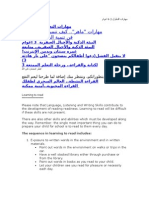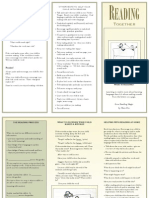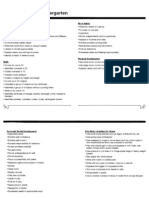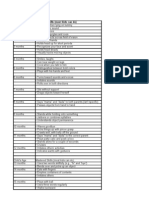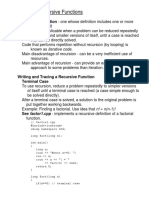Toddler Handouts Part Two Language Coaching
Toddler Handouts Part Two Language Coaching
Uploaded by
Holly Maria CassonCopyright:
Available Formats
Toddler Handouts Part Two Language Coaching
Toddler Handouts Part Two Language Coaching
Uploaded by
Holly Maria CassonOriginal Title
Copyright
Available Formats
Share this document
Did you find this document useful?
Is this content inappropriate?
Copyright:
Available Formats
Toddler Handouts Part Two Language Coaching
Toddler Handouts Part Two Language Coaching
Uploaded by
Holly Maria CassonCopyright:
Available Formats
Refrigerator Notes
Facilitating Children’s Language & Pre-School
Readiness Skills: Parents as “Coaches”
“Descriptive commenting” is a powerful way to strengthen children’s language skills. The following
is a list of actions, behaviors and objects that can be commented upon when playing with your
child. Use this checklist to practice descriptive commenting concepts.
Objects, Actions Examples
______ colors “You have the red car and the yellow truck.”
______ number counting “There are one, two, three dinosaurs in a row.”
______ shapes
“Now the square Lego is stuck to the round Lego.”
______ names of objects
“That train is longer than the track.”
______ sizes (long, short, tall,
smaller than, bigger than, “You are putting the tiny bolt in the right circle.”
etc.,)
“The blue block is next to the yellow square, and
______ positions (up, down, the purple triangle is on top of the long red
beside, next to, on top, rectangle.”
behind, etc.,)
Persistence
______ working hard “You are working so hard on that puzzle and
______ concentrating, focusing thinking about where that piece will go.”
______ stay calm, patience “You are so patient and just keep trying all different
______ trying again ways to make that piece fit together.”
______ problem solving “You are staying calm and trying again.”
______ thinking skills “You are thinking hard about how to solve the
______ reading problem and coming up with a great solution to
make a ship.”
Behaviors
______ following parent’s directions “You followed directions exactly like I asked you.
______ listening You really listened.”
______ independence “You have figured that out all by yourself.”
______ exploring
Part 2: Coaching to Promote Toddlers’ Language Skills ©The Incredible Years®
REFRIGERATOR NOTES
Promoting Toddlers’ Language and Pre-School Readiness Skills
• Prompt your toddler to communicate by modeling the words for him to repeat
• Praise your toddler’s use of words
• Chant and sing rhymes and teach your child body movements that go with the
words
• Use many more descriptive comments than questions
• Describe your toddler’s actions
• Praise and give positive feedback to your toddler (that’s right!)
• Describe your toddler’s body parts and feelings
• Listen to your toddler and imitate, or mirror, your toddler’s words
• Notice what your toddler is interested in and talk about it
• Describe the objects, shapes, numbers, letters and colors of toys your toddler plays
with
• Describe what your own actions to your toddler (e.g, “I’m going to the kitchen now)
• Tell your toddler you love him or her and share feelings of joy
• Notice when your toddler is working hard, concentrating, being calm, staying
patient with a frustrating activity, trying again and name or describe this persistence
• Read to your toddler often
• Give your child opportunities to color and describe his actions
• Talk about positions of objects (e.g., inside, under, beside, next to)
• Talk about simple every day stories and events
• Use puppets to make up stories with your toddler
• Use make believe such as pretend phones to encourage talking
• Try to really understand what your toddler is saying
• Use new words to expand her vocabulary even if you know she won’t understand at
first
ew
I use n th
wi
words ld
my chi
Part 2: Coaching to Promote Toddlers’ Language Skills ©The Incredible Years®
REFRIGERATOR NOTES
Reading with Your Toddler
• Read at a quiet time when you are relaxed and comfortable–with TV and music turned
off (this prevents over stimulation)
• Hold your toddler in comfortable position on your lap when reading
• Read for a few minutes each day when your toddler seems calm and alert. (Reading
at bedtime is a great routine to have established because it helps your toddler calm
down.)
• If you have other children, read to them as well
• Use “parent-ese” language when reading, because this is preferred by
toddlers over regular communication. Parent-ese sounds like this:
- singsong, higher pitched, slower voice
- clear articulation (not baby talk)
- pause longer after speaking to wait for response
- words repeated often
- reader uses an exaggerated facial expression (big smiles) when
responding
- expressive voice using sound effects (for animals, cars, actions)
• Point to pictures in the book and talk about them or make up stories
• Re-read books your toddler likes many times
• Chant and sing rhymes
• Use hand movements with words
• Praise and give positive feedback (that’s right!)
• Slide your finger under the words or letters on the page and show left to right move-
ment
• Encourage your toddler to turn the pages
• Read the names of the author and illustrator to your toddler as you begin reading
• Go to the library together for story time or just to browse. Let your child pick several
books to take home
t
I repea
words
often
Part 2: Coaching to Promote Toddlers’ Language Skills ©The Incredible Years®
REFRIGERATOR NOTES
Reading with Your Toddler
• For 12-18-month-old toddlers–read books that encourage your toddler to chime
in and repeat words; books that label objects and parts of the body; books that
illustrate action words such as walking or running; and books with flaps or noises.
• For 18-24 month old toddlers–read books about your toddler’s interests (boats,
trucks); books that include hand movements; books with numbers, colors, shapes;
books with stories that show feelings.
• Read books that reflect your toddler’s experience such as having a bath, putting
on boots for the rain; books that use phrases such as good-bye, thank you; books
that ask questions; books with rhymes and songs with hand movements;
• Keep reading each day.
Remember, toddlers have a wide range in attention span, that will vary daily. Don’t
worry if your toddler seems restless and gets off your lap. Keep reading and ask him
questions about the story to see if he is still interested. If he responds keep reading, if
he seems more interested in another activity, wait and try to read again later.
Most toddlers will want to have the same book read over and over again–this is impor-
tant to them because it provides security and allows them to memorize the book so
they get a feeling of mastery over the book. Then they may even read the book back
to you! It is an important pre-reading skill.
he
I read t ok
o
same b over
d
over an
Part 2: Coaching to Promote Toddlers’ Language Skills ©The Incredible Years®
REFRIGERATOR NOTES
Social & Emotional Developmental Landmarks
19–24 months
• Enjoys helping around the house (19 months)
• Understand most of what you say–about 200 words (19–20 months)
• Still loves rhymes and songs repeated (all months)
• Recognizes when something is wrong (19–20 months)
• Captivated by visual illustrations in books (20 months)
• Points to picture when you name it (20 months)
• Can say 50-100 or more words–learns at a rate of 10 or more per day!
(20–24 months)
• Imitates expressions (even swear words!)
• Imitates what you do (clean table, wash dishes) (20
months)
• Does pretend play such as feed baby doll (20 months)
Imitates
• Can identify and name several body parts (20 months)
expressions
• Learns how to form a question–“why” (21–22 months)
• Starts using action words (e.g., more, eat)
• Name simple picture in book (22 months)
• Sings simple tunes (23–24 months)
• Begins to be interested in playing with other children (24 months)
• Half of speech can be understood (24 months)
• Can make 2–3 word phrases (“me go”) (24 months)
Part 2: Coaching to Promote Toddlers’ Language Skills ©The Incredible Years®
REFRIGERATOR NOTES
Physical Developmental Landmarks 19–24 months
• Uses fork and spoon (19 months)
• Can take off clothes (20 months)
• Can walk up but not down stairs (20–21 months) Solves simple
• Stacks 6 blocks (21–22 months) puzzles
• Does simple puzzles (22–23 months)
• Puts on loose clothing (23–24 months)
Part 2: Coaching to Promote Toddlers’ Language Skills ©The Incredible Years®
REFRIGERATOR NOTES
Building Blocks for Reading
With CARE
C Comment, use descriptive commenting to describe pictures.
Take turns interacting, and let your child be the
storyteller by encouraging him/her to talk about the pictures.
A Ask open-ended questions.
“What do you see on this page?” (observing and reporting)
“What’s happening here?” (storytelling)
“What is that a picture of?” (promoting academic skills)
“How is she feeling now?” (exploring feelings)
“What is going to happen next?” (predicting)
R Respond with praise and encouragement to your child’s thinking
and responses.
“That’s right!”
“You are really thinking about that.”
“Wow, you know a lot about that.”
E Expand on what your child says.
“Yes, I think he’s feeling excited, too, and he might be a little
scared as well.”
“Yes, it is a horse; it’s also called a mare.”
“Yes, that boy is going to the park. Do you remember going to
the park?”
ith
I read w my
o
CARE t
child
Part 2: Coaching to Promote Toddlers’ Language Skills ©The Incredible Years®
Refrigerator Notes
Goodness of Fit—Managing Your Child’s Temperament
Even if parents have different temperaments than their children, they can still strive
for a good fit with their child. A good fit is when parent’s demands and expectations
are compatible with their child’s temperament, abilities and characteristics. The goal is
always to manage rather than to squelch or change temperament.
Here are some tips for achieving a good fit and managing your child’s temperament.
• Realize that your child’s temperament style is not your “fault” because tempera-
ment is something biological and innate, not something that is learned from par-
ents. Your child is probably not purposely trying to be difficult or irritating. Don’t
blame him or yourself.
• Respect your child’s temperament without comparing to other siblings or trying to
change his or her basic temperament.
• Consider your own basic temperament and behavior and tailor your parenting
responses when they clash with your child’s responses to encourage a better fit.
• Remember what you model for your children is what they learn from you.
• Try to consider and anticipate your child’s adaptability, activity level, sensitivity,
biological rhythms and ability to sustain attention when planning activities that are
most suitable for your child.
• Try to focus on the issues of the moment. Do not project into the future.
• Review your expectations for your child, your preferences and your values. Are
they realistic and appropriate?
• Anticipate high risk situations and try to avoid or minimize them.
• Enjoy the interactions and the differences in each of your children.
• Avoid labeling your child as bad or difficult as this may lead to negative self-image
and further compound his difficulties.
• Try to distinguish between a tantrum that is temperamentally induced (reaction to
disappointment) versus one that is manipulative (designed to get parent to give
in).
• Help your child develop a positive self-esteem – that is, to
have a fair sense of his strengths and weaknesses.
• Find a way to get relief for yourself and your child by
scheduling some time apart.
Remember above all temperament qualities can be
shaped to work to a child’s advantage if they are sensibly
managed.
Part 2: Coaching to Promote Toddlers’ Language Skills ©The Incredible Years®
You might also like
- Physics Worksheet AS Level - ConversionDocument4 pagesPhysics Worksheet AS Level - ConversionHolly Maria Casson50% (2)
- Universal - Uns-1 - 60x Quick Start ManualDocument23 pagesUniversal - Uns-1 - 60x Quick Start ManualEl Bee100% (2)
- Self Assessment Preschool Teaching PracticesDocument3 pagesSelf Assessment Preschool Teaching Practicesapi-497849152No ratings yet
- Undergraduate Advanced Diploma in English Literature (Course Specification)Document18 pagesUndergraduate Advanced Diploma in English Literature (Course Specification)Holly Maria CassonNo ratings yet
- Silica Gel Production Report PDFDocument8 pagesSilica Gel Production Report PDFChoice Organo0% (1)
- Class Nursery - Summer Holidays Homework 2023 (A)Document48 pagesClass Nursery - Summer Holidays Homework 2023 (A)YaqubNo ratings yet
- FPK HandbookDocument8 pagesFPK HandbookGenesis De Vera DiocaresNo ratings yet
- Kindergarten Readiness FinalDocument6 pagesKindergarten Readiness FinalDebora FernandesNo ratings yet
- Topic 3 - Early Literacy Done PrintDocument26 pagesTopic 3 - Early Literacy Done Printg-88548294No ratings yet
- Rif Read Aloud Tips GuideDocument18 pagesRif Read Aloud Tips Guideapi-538953209No ratings yet
- 3 and 4 Year Old SequnceDocument73 pages3 and 4 Year Old Sequnceibrahim100% (3)
- Literacy Development From Birth To Age ThreeDocument26 pagesLiteracy Development From Birth To Age ThreekarmavisionNo ratings yet
- Reading Teaching PamphletDocument2 pagesReading Teaching PamphletmlyisNo ratings yet
- TCHP - Ideas For Speech Encouragement - KDocument3 pagesTCHP - Ideas For Speech Encouragement - KChristopher ChiangNo ratings yet
- Activities To Try at HomeDocument2 pagesActivities To Try at HomeCatalina NicaNo ratings yet
- WordWiseSample1 0 1Document13 pagesWordWiseSample1 0 1MindWorks ResourcesNo ratings yet
- Case Study-Child Dev MilestoneDocument6 pagesCase Study-Child Dev Milestoneapi-280792337No ratings yet
- Effective Parenting - Literacy May - 06Document13 pagesEffective Parenting - Literacy May - 06stevenerrolNo ratings yet
- JKgoals and 101Document4 pagesJKgoals and 101etalbott1803No ratings yet
- Activities To Improve Gross Motor SkillsDocument16 pagesActivities To Improve Gross Motor SkillsarchbarcNo ratings yet
- GROW - Bulletin - Learner AssessmentDocument9 pagesGROW - Bulletin - Learner Assessmentrethabilesikhosana6No ratings yet
- Communication Milestones 4 To 5 YearsDocument2 pagesCommunication Milestones 4 To 5 YearsAya AbouseifNo ratings yet
- Echolalia - Practical Tips and Free Links by LLLDocument3 pagesEcholalia - Practical Tips and Free Links by LLLEDMOND0421No ratings yet
- Homelit Message Leaflet 1 English in HouseDocument2 pagesHomelit Message Leaflet 1 English in HousePearl PhillipsNo ratings yet
- LTS Cordova 1Document14 pagesLTS Cordova 1John BanaciaNo ratings yet
- Early Literacy NewDocument66 pagesEarly Literacy NewAnonymous zza2AVhMTJNo ratings yet
- Speech and Language Development 09.10Document19 pagesSpeech and Language Development 09.10Jam Knows RightNo ratings yet
- Usborne: First LearningDocument28 pagesUsborne: First LearningAdrianaJuarez100% (7)
- CPT Activities - Toddler - Set PDFDocument25 pagesCPT Activities - Toddler - Set PDFOISteacher100% (2)
- Tutoring Strategies For Preschool and KindergartenDocument11 pagesTutoring Strategies For Preschool and KindergartenKarrie Mae GolilaoNo ratings yet
- Change in LanguageDocument18 pagesChange in Languageusama aliNo ratings yet
- Activity Cards PDFDocument39 pagesActivity Cards PDFatarah100% (2)
- Teaching Learning Material For Pre - School Children.Document7 pagesTeaching Learning Material For Pre - School Children.moumeet012No ratings yet
- Module 4Document24 pagesModule 4riki rikoNo ratings yet
- Speech Develop MilestonesDocument2 pagesSpeech Develop MilestonesMarianna Moustaka100% (2)
- Activities For Promoting EarlyLiteracyDocument28 pagesActivities For Promoting EarlyLiteracyrgibson26No ratings yet
- Ed334 ActivitiesDocument39 pagesEd334 Activitiesapi-722847247No ratings yet
- I.Table Guide For Children With DisabilitiesDocument26 pagesI.Table Guide For Children With Disabilitiesbai yhang de la cruzNo ratings yet
- From Birth To 3 Months: RootingDocument5 pagesFrom Birth To 3 Months: RootingJames_abilogNo ratings yet
- Questionnaire Kindergarten Teachers 05Document4 pagesQuestionnaire Kindergarten Teachers 05Cristina ToneaNo ratings yet
- Product Cochlearimplant Rehabilitationresources Soundfoundationfortoddlers Tipsfortoddlers n360160 en Iss1 2011 95.7kb PDFDocument12 pagesProduct Cochlearimplant Rehabilitationresources Soundfoundationfortoddlers Tipsfortoddlers n360160 en Iss1 2011 95.7kb PDFAnju BalaNo ratings yet
- Story-Telling: Early Literacy Activity GuideDocument27 pagesStory-Telling: Early Literacy Activity GuideJohn Ting100% (2)
- Heart Task Loosen The Knot From My Tongue So That They Might Understand My SpeechDocument32 pagesHeart Task Loosen The Knot From My Tongue So That They Might Understand My SpeechNaeem ShehzadNo ratings yet
- Louisiana Continuous Education Toolkit Guidance For Early Learning at HomeDocument5 pagesLouisiana Continuous Education Toolkit Guidance For Early Learning at HomeChris CorralesNo ratings yet
- Together Every DayDocument6 pagesTogether Every DaykinetokidNo ratings yet
- Star of The Week: Nightly ReadingDocument2 pagesStar of The Week: Nightly Readingbrianhunt2014No ratings yet
- FDL - PromotingLiteracyDocument3 pagesFDL - PromotingLiteracycaitiemathersNo ratings yet
- To 2 YearsDocument16 pagesTo 2 YearsEli Rguez CasillasNo ratings yet
- PLAY SkillsDocument27 pagesPLAY Skillssaed100% (1)
- Child DevelopmentDocument6 pagesChild Developmentdhananjay007100% (3)
- Little Red HenDocument27 pagesLittle Red Henmangkuk91100% (2)
- Successfulstorytimes July09Document17 pagesSuccessfulstorytimes July09api-300952189No ratings yet
- Portage Co1mmunicationDocument8 pagesPortage Co1mmunicationNam Tước Bóng ĐêmNo ratings yet
- Baby: Stages of DevelopmentDocument7 pagesBaby: Stages of DevelopmentSharishen Redzuan PerpinderNo ratings yet
- Handouts For Parents Preschool Speech and Language PracticeDocument6 pagesHandouts For Parents Preschool Speech and Language PracticeLanaNo ratings yet
- Tema 3.1 (P.2) InglésDocument6 pagesTema 3.1 (P.2) InglésLucía Cobo RodríguezNo ratings yet
- Teaching Young Learners: Principles, Strategies and TrainingDocument44 pagesTeaching Young Learners: Principles, Strategies and TrainingDesra Liana BuchariNo ratings yet
- Helping Your Child With Literacy and Numeracy at Home Update 2023Document40 pagesHelping Your Child With Literacy and Numeracy at Home Update 2023rirak17076No ratings yet
- Child Dev MilestoneDocument6 pagesChild Dev Milestoneapi-250547670No ratings yet
- Book Reading Checklist Educators FillableDocument4 pagesBook Reading Checklist Educators FillableursulaNo ratings yet
- Baby Sensory Story Cards Under The SeaDocument3 pagesBaby Sensory Story Cards Under The SeaHolly Maria CassonNo ratings yet
- Eyfs - Speech and Language ToolkitDocument9 pagesEyfs - Speech and Language ToolkitHolly Maria CassonNo ratings yet
- Physics Jeopardy Game - Forces & MotionDocument52 pagesPhysics Jeopardy Game - Forces & MotionHolly Maria CassonNo ratings yet
- Ocr Physics AS Teacher Support CD SampleDocument3 pagesOcr Physics AS Teacher Support CD SampleHolly Maria CassonNo ratings yet
- OCR A Physics Chapter 9Document26 pagesOCR A Physics Chapter 9Holly Maria CassonNo ratings yet
- Pioneer VSX 409RDSDocument40 pagesPioneer VSX 409RDSturucNo ratings yet
- Cooperative LearningDocument3 pagesCooperative LearningSamantha Perez100% (1)
- He Teacher and The Community School Culture and Organizational Leadership SourceDocument32 pagesHe Teacher and The Community School Culture and Organizational Leadership SourceJhon NavarroNo ratings yet
- ALOS PALSAR 25-Meter Mosaic Step-By-Step Manual On Extraction of Forest Cover and Change Detection AnalysisDocument160 pagesALOS PALSAR 25-Meter Mosaic Step-By-Step Manual On Extraction of Forest Cover and Change Detection Analysis7alestariNo ratings yet
- E 180 000 2 11 13Document408 pagesE 180 000 2 11 13spaszko54No ratings yet
- Kitchen EquipmentDocument6 pagesKitchen EquipmentChandan BhattacharjeeNo ratings yet
- Full Test 2Document5 pagesFull Test 2ngocyen_xitrumNo ratings yet
- Question Paper Code:: Reg. No.Document3 pagesQuestion Paper Code:: Reg. No.Bijivemula Sruthi ReddyNo ratings yet
- PPG Week D - PowerDocument6 pagesPPG Week D - PowerBonifacio Naoe IINo ratings yet
- Vitara BrezzaDocument366 pagesVitara Brezzahgprashu kumarNo ratings yet
- TDM 850 1999Document81 pagesTDM 850 1999Txikito del BidasoaNo ratings yet
- EA-EQF-EKR Series Bearing Brochure - Issue 03Document12 pagesEA-EQF-EKR Series Bearing Brochure - Issue 03James EllisNo ratings yet
- RCA Victor Service Notes 1937Document389 pagesRCA Victor Service Notes 1937rigonlee100% (1)
- Personal Information FormDocument2 pagesPersonal Information FormDanicaNo ratings yet
- HVDC Control & ProtectionDocument31 pagesHVDC Control & ProtectionS Bharadwaj ReddyNo ratings yet
- MTH401 - Practice QuestionsDocument4 pagesMTH401 - Practice Questionsmona_shahNo ratings yet
- Haryana State Team Contact DetailDocument1 pageHaryana State Team Contact DetailAbhiNo ratings yet
- Applied Elasticity - Chapter 1Document59 pagesApplied Elasticity - Chapter 1Aayush NeopaneNo ratings yet
- Practical Design Guide For Glass Reinforced ConcreteDocument98 pagesPractical Design Guide For Glass Reinforced ConcreteThompson LaiNo ratings yet
- COMM4 VerderberSellnow Ch02Document33 pagesCOMM4 VerderberSellnow Ch02smk1983No ratings yet
- WEG Stock Motor Catalog General Purpose Motors Usa100 Brochure EnglishDocument50 pagesWEG Stock Motor Catalog General Purpose Motors Usa100 Brochure EnglishOmar SchettiniNo ratings yet
- Películas Nuevas para La Primavera, May 2015: To Download These and Future IssuesDocument94 pagesPelículas Nuevas para La Primavera, May 2015: To Download These and Future IssuesVladimir IlichNo ratings yet
- El3356 0010Document3 pagesEl3356 0010Krishnamurthy KulkarniNo ratings yet
- Design of PSC Box 45.0 M Span PDFDocument89 pagesDesign of PSC Box 45.0 M Span PDFsiddharth yadavNo ratings yet
- Material Take Off Bulk MTODocument6 pagesMaterial Take Off Bulk MTOJordan MosesNo ratings yet
- Recursive Functions: Writing and Tracing A Recursive Function Terminal CaseDocument11 pagesRecursive Functions: Writing and Tracing A Recursive Function Terminal CaseSamiul Alim LesumNo ratings yet
- BM200Document64 pagesBM200Ing RiveraNo ratings yet
- Continuum of Depth of Sedation Definition of General Anesthesia and Levels of Sedation Analgesia PDFDocument2 pagesContinuum of Depth of Sedation Definition of General Anesthesia and Levels of Sedation Analgesia PDFMaria Aurelia PrajitnoNo ratings yet










